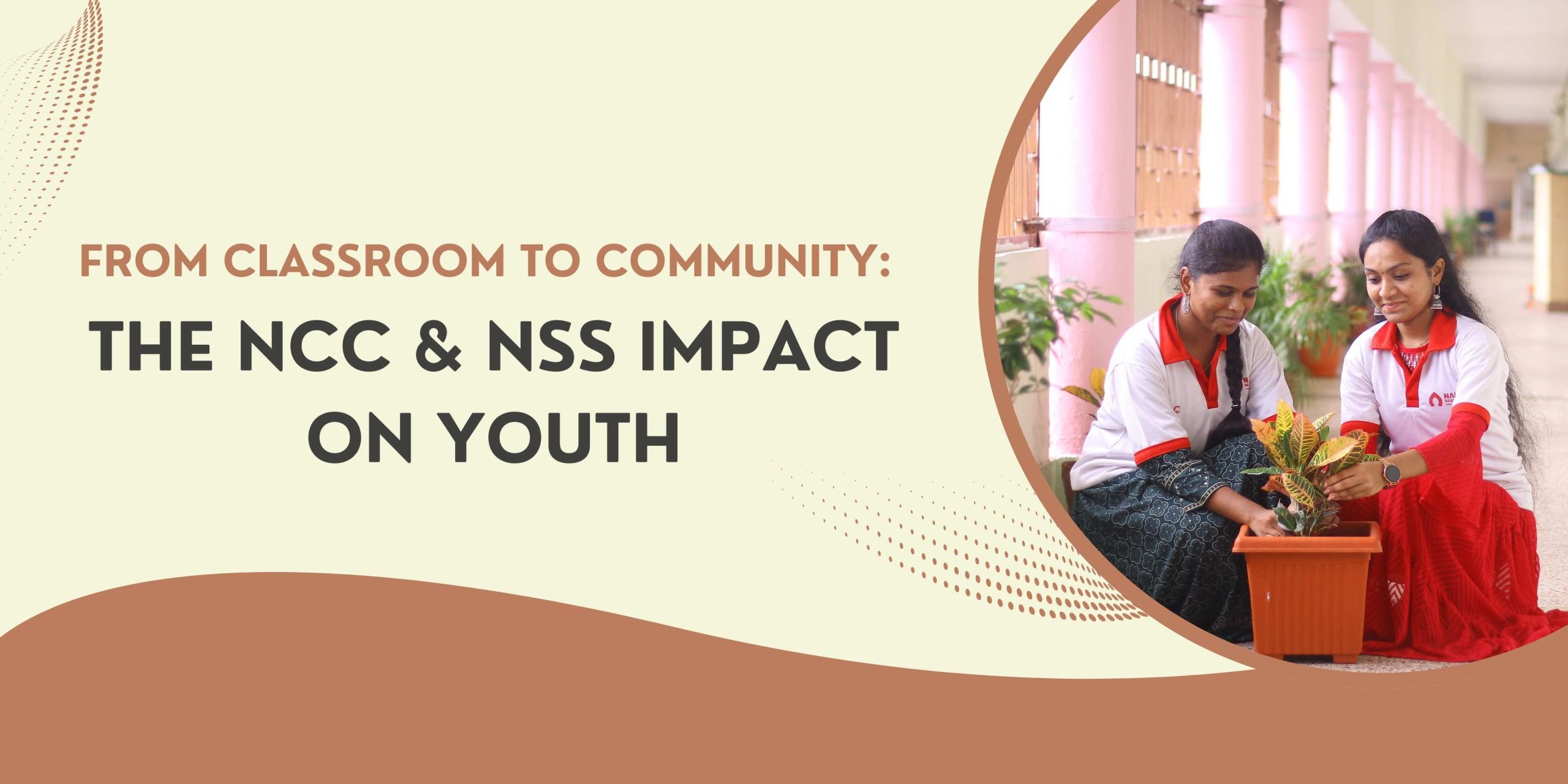Youth is the heartbeat of any nation. Their actions, values, and contributions decide the direction a country will take in the future. While classroom education gives them knowledge and academic strength, real transformation happens when they step outside and engage with the world. This is where programs like the National Cadet Corps (NCC) and the National Service Scheme (NSS) make a lasting impact.
These two powerful initiatives go beyond books and exams. They shape character, leadership, discipline, and social awareness in students. In this article, we explore how NCC and NSS bridge the gap between college life and community service, and how they turn ordinary students into responsible, aware, and action-driven citizens.
Understanding NCC and NSS in the College Environment
What Is NCC?
The National Cadet Corps (NCC) is a military-inspired youth organization supported by the Ministry of Defence. It was established in 1948 with the goal of building discipline, unity, and leadership among students. NCC cadets participate in:
- Military drills and parades
- Physical training, adventure activities
- Annual training camps and national integration events
- Social service drives like blood donation and disaster relief
It instills patriotism, quick thinking, and physical endurance—skills that benefit both the individual and the nation.
What Is NSS?
The National Service Scheme (NSS) has been active since 1969 under the Ministry of Youth Affairs and Sports of India. It encourages community service work performed by students in colleges. Its goal is to promote social awareness and concern along with empathy through actual work in rural and urban settings. Some of the activities undertaken by NSS are:
- Health Education and Promotion
- Cleanliness Drives and Environmental Protection
- Literacy and Blood Donation Drives
- Organized Service and Teaching Camps in Villages
NSS seeks to empower students to create change on the ground while coming to terms with real-world difficulties.
How NCC and NSS Transform Students
Bridging the Gap Between Theory and Practice
Theory is often taught in college. NSS and NCC provide opportunities to practice what students learn in class. Planning an awareness rally, organizing village camps, or crisis management of relief operations can be learnt only by doing. Students are no longer passive learners, but active change makers.
Building Leadership and Sense of Responsibility
NCC and NSS employ students in leadership positions such as commanding a drill squad or running a health camp. Students learn decision-making and guiding others while managing challenges. Such responsibilities build a sense of maturity, accountability, and confidence.
Advocacy of Social and National Awareness
NCC instills patriotism and strengthens social consciousness by community service through NSS. Collectively, they assist learners in grasping their responsibilities towards the advancement of the nation, rural development, and society’s betterment.
Skill Development for the Future
Participation in NCC and NSS enables students to acquire the following skills:
- Managing time
- Sending and receiving information as well as cooperation
- Resolving issues in high-pressure situations
- Planning and organizing activities
These skills will be helpful in the government sector, private sectors, and even self-employment.
Reaching Beyond the Campus
NCC’s Community Impact
NCC’s Community Engagement is frequently seen in:
- First response aid in floods and fires or any other natural catastrophes.
- Sociocultural awareness parades for events like traffic safety, anti-drug campaigns, and fitness.
- Volunteering in blood donation drives and providing first-aid services in public gatherings.
These efforts immerse students into the actual world where they act as disciplined representatives of their colleges and communities.
The NSS and Its Local Impact
NSS students volunteer in remote areas, particularly in the villages. They help in:
- Conducting free medical and legal awareness programs.
- Teaching underprivileged children how to read and write.
- Promoting cleanliness, healthy nutrition, and environmental conservation.
Exposure to these experiences help students develop compassion and commitment.
Real-World Benefits for Students
Value in Competitive Exams and Government Jobs
Active participation in NCC and NSS is an added benefit in:
- Civil service and government job applications.
- Armed forces. Police services, especially for holders of NCC ‘B’ and ‘C’ certificates.
- Applying to universities and attending scholarship interview sessions.
These activities prove that the learner is self-motivated and displays discipline along with potential for leadership.
Personality and Career Readiness
With effective communication, initiative taking, and quick adaptation, students become confident and work-ready. These traits are refined through active engagement with people, leadership roles, and task completion.
Respect in Society and Peer Groups
Students enrolled in NCC and NSS are often regarded as leaders or exemplary figures in their college due to the discipline, service-oriented mentality, and active participation that commands the respect of peers, teachers, and even the community.
Nalanda Degree College’s Role in Shaping Community-Conscious Students
Active NCC and NSS Units
NSS and NCC have traditionally been encouraged at Nalanda Degree College from the first year itself. The College has units which provide regular training, camps, and drives which ensures early participation.
Social Projects and Student Initiatives
Students of Nalanda have participated in:
- Awareness campaigns for health and sanitation
- Environmental rally and afforestation drives
- Traffic control awareness with city police
- Volunteer support for local disaster response
Such projects help students to integrate theory with practice.
Integration of Learning Through Community Service
Students of Nalanda are citizenry and self-motivated due to the emphasis placed on social work discipline alongside academic achievements. The schedules of NCC and NSS programs are well planned in line with the academic calendar so that learning occurs simultaneously with contribution.
Conclusion
Students participate actively through teaching in NSS camps, and rifle drills in NCC camps. This transformative participation helps students to acquire core competencies and a well-rounded perspective on life.
NSS and NCC contribute towards students’ professional and personal development. Students learn traits like social responsibility and even service to community which last for life beyond college.
In each and every student, there lies potential which should be harnessed. All colleges should aid in this. It is remarkable how such disciplined and responsible youth can uplift our nation.
